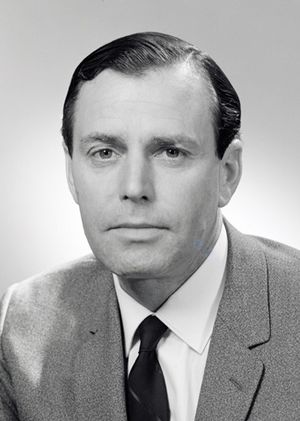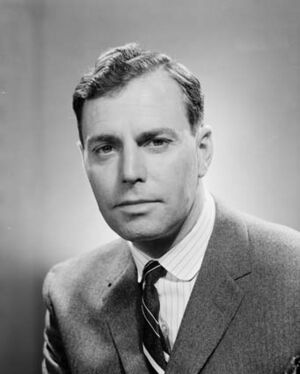James Webster (Australian politician) facts for kids
Quick facts for kids
James Webster
|
|
|---|---|
 |
|
| Minister for Science and the Environment | |
| In office 5 December 1978 – 8 December 1979 |
|
| Prime Minister | Malcolm Fraser |
| Preceded by | Himself (Science) Ray Groom (Environment) |
| Succeeded by | David Thomson |
| Minister for Science | |
| In office 22 December 1975 – 5 December 1978 |
|
| Prime Minister | Malcolm Fraser |
| Preceded by | Bob Cotton |
| Succeeded by | Himself (Science and the Environment) |
| Senator for Victoria | |
| In office 9 December 1964 – 28 January 1980 |
|
| Preceded by | Harrie Wade |
| Succeeded by | Laurence Neal |
| Personal details | |
| Born | 14 June 1925 Flinders Island, Tasmania, Australia |
| Died | 3 April 2022 (aged 96) Brighton, Victoria, Australia |
| Political party | Country / NCP |
| Spouses |
Jean Drake
(m. 1957–1989)Jeanette Hillis
(m. 1993) |
| Relations | Leslie Webster (father) |
| Occupation | Accountant, farmer |
James Joseph Webster (born 14 June 1925 – died 3 April 2022) was an important Australian politician. He served as a Senator for the state of Victoria from 1964 to 1980. During his time in government, he was a member of the National Country Party.
Webster held key roles as the Minister for Science from 1975 to 1978. Later, he became the Minister for Science and the Environment from 1978 to 1979. Both of these roles were part of the Fraser Government. After leaving politics, he became Australia's top representative in New Zealand, known as the High Commissioner to New Zealand, serving from 1980 to 1983.
Contents
Early Life and Education
James Webster was born on 14 June 1925, on Flinders Island, which is part of Tasmania. He was the youngest of three sons. His father, Leslie Webster, was a local business leader. He also served as the head of the Flinders Island Butter Factory and the Flinders Island Municipal Council.
In 1929, when James was four, his family moved to Victoria. His father first ran a timber and hardware business in Melbourne. In 1932, the family settled on a farm in Greenval. James went to state schools and later finished his education at Caulfield Grammar School. During World War II, he helped manage the family farm. He also joined the Air Training Corps. His father was also a politician, serving in the state parliament from 1944 to 1947.
After school, Webster took business classes at the YMCA. He then studied accounting at Melbourne Technical College. He worked in various jobs, including as a clerk at a timber company. He was also a chief clerk at a sawmill and a tallyman (someone who counts goods) on the Melbourne wharves. He was active in the labour movement. He was a delegate for the Australian Timber Workers' Union. He was also a member of the Waterside Workers' Federation. In 1948, he joined his family's business, J. J. Webster Pty Ltd. This company, founded by his grandfather in 1884, sold timber, hardware, and plumbing supplies in Elsternwick. In 1954, he became a director of Lords Holdings Limited, a company that supplied building materials.
Political Career
James Webster joined the Young Country Party in 1940. He was a member of the party's Federal Council from 1960 to 1964. He also served as the state president of the Victorian Country Party from 1963 to 1964. In the 1955 state election, he tried to win a seat in Broadmeadows but was not successful.
In December 1964, Webster was chosen to become a Senator. This happened because of a casual vacancy after Senator Harrie Wade passed away. He was re-elected several times: in 1966, 1967, 1974, and 1975. As a Senator, Webster was very active. He served on many different Senate committees. He often supported government help and tax benefits for farming industries. He also believed in public funding for the Australian film industry. He supported creating groups like the Australian Film Development Corporation and the Australian Film Commission.
In December 1975, Webster became the Minister for Science in the Fraser Government. In 1978, he also took on the environment role. This made him the Minister for Science and the Environment.
In 1979, Webster announced a big change for whaling. The responsibility for whaling moved from the Department of Primary Industry to his department. He then stated that the government would work to stop illegal "pirate" whaling. He was strongly committed to protecting whales. During his time as minister, Australia and Seychelles worked together. They successfully convinced the International Whaling Commission (IWC) to create the Indian Ocean Whale Sanctuary. This was a major step in protecting whales.
Later Life and Legacy
In December 1979, it was announced that James Webster would leave politics. He was chosen to become the High Commissioner to New Zealand. This meant he would be Australia's main representative in New Zealand. He officially left the Senate in January 1980. Laurence Neal took his place as Senator.
Webster served as High Commissioner during important talks. These discussions led to the Closer Economic Relations agreement between Australia and New Zealand. This agreement made trade and travel easier between the two countries. His term as High Commissioner ended in October 1983. After this, he returned to farming in Victoria.
Family and Community Involvement
James Webster married Jean Drake in 1957. They had four sons together. They later divorced in 1989. In 1993, he married Jeanette Hillis.
Webster was also very involved in his church and community. He became an elder in the Presbyterian Church of Victoria when he was 21. He also served on the board of the Victorian School for Deaf Children for many years, from 1954 to 1974.
James Webster passed away in Brighton, Victoria on 3 April 2022. He was 96 years old. His funeral was held at St Leonards Uniting Church.
See also
- List of Caulfield Grammar School people
 | Audre Lorde |
 | John Berry Meachum |
 | Ferdinand Lee Barnett |


